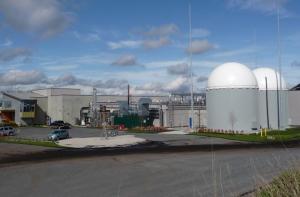
Waste streaming is becoming a profitable new energy source, and Waste Management Inc. of Houston, Texas, which owns thousands of garbage trucks and hundreds of landfills, is on the cutting edge, investing in a group of waste conversion firms to broaden its business and cut down on the need for new, hard-to-permit landfill sites.
Investments in companies like Enerkem, which turns municipal solid waste into ethanol, or Agilyx, recycling waste plastics into synthetic crude oil, are a start, but it's estimated that the $12.3 billion Waste Management gets for carting off rubbish to landfills every year may be worth more than $40 billion if it were all turned into energy.
Another investment, startup Harvest Power, has a solution for Waste Management's grass and tree trimmings, half-eaten hotdog buns, orange peels and other food scraps: turn it into energy and compost. Harvest Power recently launched its Energy Garden in British Columbia, which is the largest commercial-scale high solids anaerobic digester in North America.
The facility can convert up to 40,000 tons a year of food and yard waste into clean energy to power about 900 homes, while providing hundreds of thousands of cubic yards of top quality soil amendments to local farms and gardens.
"This facility represents the innovation to usher in the future of organics management," says Paul Sellew, Harvest Power founder and CEO. And as he declares in his Tedtalk, Harvest Power is the first step in reimagining the logistics of America's entire food system.
See the video in the panel at right.


